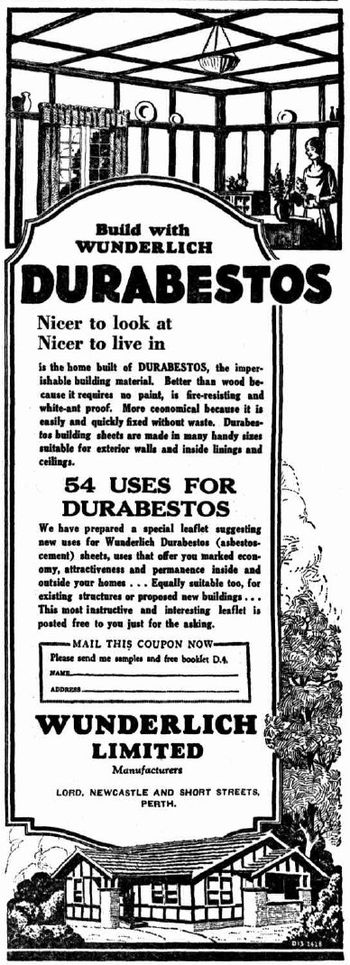Which Buildings Require Asbestos Testing Prior to Renovation/Demolition?
English: Advertisement for “Durabestos” (Photo credit: Wikipedia)
Q: Which Buildings Require Asbestos Testing Prior to Renovation/Demolition?
A: All of Them ( Excerpt from The Monitor www.asse.org)
One of the most common misconceptions an environmental consultant with a focus on industrial hygiene, and specifically asbestos, is confronted with is that newer buildings, specifically those built after 1980, cannot contain asbestos. This would mean they are not subject to asbestos inspection and sampling provisions required by EPA’s National Emission Standards for Hazardous Air Pollutants: Asbestos (Asbestos NESHAP) [40 Code of Federal Regulations (CFR) Part 61, Subpart M]. Asbestos NESHAP states that “the owner or operator of a demolition or renovation activity and prior to the commencement of the demolition or renovation will thoroughly inspect the affected facility or part of the facility where the demolition or renovation operation will occur for the presence of asbestos. “The term facility, as defined in Asbestos NESHAP, excludes residential buildings having four or fewer dwelling units. The basis for this misunderstanding appears to derive from misinterpretations of the following:
•EPA asbestos bans, including the “Ban and Phase Out” (40 CFR 763, Subpart I);
•OSHA asbestos standards (Construction (29 CFR 1926.1101) and General Industry (29 CFR 1910.1001);
•EPA “Asbestos-Containing Materials in Schools” (40 CFR 763, Subpart E). BANNED ASBESTOS-CONTAINING PRODUCTS
Contrary to most widely held opinions, products containing asbestos have not been completely banned for
use or import in the U.S. In fact, the list of banned asbestos-containing products is limited to only ten types
of building products, plus the prohibition on newly developed uses for asbestos. The list includes:
•Surfacing materials, defined in 40 CFR 763, Subpart E, as material that “is sprayed-on, troweled-on or other-wise applied to surfaces,” were among the first products banned. The following asbestos-containing surfacing materials are currently subject to ban:
•spray-applied asbestos-containing material (ACM) for fireproofing/insulating (banned by NESHAP in 1973);
•spray-applied ACM banned for “decorative” purposes (banned by NESHAP in 1978);
•spray-on application of ACM to buildings, structures, pipes and conduits unless the material is encapsulated with a bituminous or resinous binder during spraying and the materials are not friable after drying (banned by
NESHAP 1990). The following asbestos-containing thermal system insulations, defined in 40 CFR 763, Subpart E, as material that “applied to pipes, fittings, boilers, breeching, tanks, ducts or other interior structural components to prevent heat loss or gain, or water condensation, or for other purposes,” are currently subject to ban:
•installation of wet-applied and preformed (molded) asbestos pipe insulation (banned by NESHAP in 1975);
•installation of preformed (molded) asbestos block insulation on boilers and hot water tanks (banned by
NESHAP in 1975).
The following asbestos-containing miscellaneous products are subject to ban in accordance with 40 CFR 763, Subpart I:
•corrugated paper;
•rollboard;
•commercial paper;
•specialty paper;
•flooring felt;
•new uses of asbestos.
Following a 1991 appeals court ruling that overturned a large portion of the “Asbestos Ban and Phase Out” rule (40 CFR 763, Subpart I), the following common consumer products are still allowed for use in the U.S.:
•vinyl-asbestos floor tile;
•roofing felt and coatings;
•asbestos-cement products (corrugated and flat sheets,
shingles, pipe);
•asbestos clothing;
•pipeline wrap;
•millboard;
•gaskets;
•non-roofing coatings;
•automotive products (automatic transmission components, clutch facings, friction materials, disc brake pads, drum brake linings, brake blocks).
Thus, it is evident from these lists that numerous building products may potentially still be manufactured with asbestos, and with the proliferation of products installed in buildings today imported from nations that do not regulate asbestos as strongly as the U.S., there is a very real potential for installation of new products containing asbestos.
Envision3 Group can help you with any of your asbestos testing needs in the Phoenix Arizona area. Call us at 480.388.4576 with any questions you might have.
Tags: asbestos, asbestos testing arizona, asbestos violations, Ahera Inspector, abestos , Hazardous Air Pollutants, National Emissions Standards for Hazardous Air Pollutants, NESHAP, Occupational Safety and Health Administration
